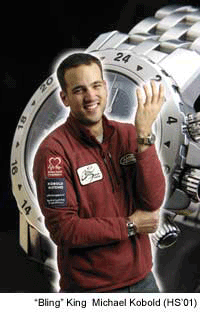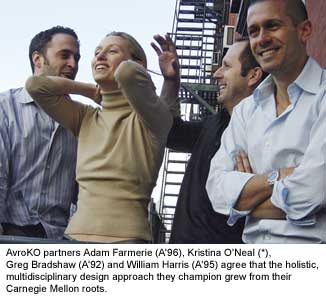Denny Morabito (HS'74), Susie Cribbs (HS'00) and Bruce Gerson
Surprising Twists in Early Career Opportunities
Would you buy a wristwatch from Tony Soprano? Would you pick a college on an anonymous tip? Would you trust cuisine developed by your architect?
Some young entrepreneurs from Carnegie Mellon University are betting you would, and so far their bets have paid off big.

Michael Kobold (HS’01) asked “Tony Soprano” (aka James Gandolfini) to be the new pitchman for Kobold Watches (aka “wrist instruments”) after the star of “The Sopranos” television series called to ask him to bring one to the set. The super-premium line of time pieces retail for as much as $22,500.
Gandolfini, who created gangland boss Tony Soprano for the HBO series, pushes the envelope of celebrity endorsement with his pose, indicating with his middle finger that Kobold watches are No. 1. WatchTime Magazine calls it “a brave marketing approach in a mature and highly competitive industry.”
Kobold founded his company as a freshman and began designing watches in his junior year. He graduated with a degree in managerial economics in only three years. Today, the 25-year-old entrepreneur is one of the youngest company presidents in the luxury goods industry.
Luke Skurman (TPR’02) went undercover to give high school students the “real” scoop on colleges by getting enrolled college kids to “tell all” about their universities—the good, the bad and the ugly.
Then he puts it all in a comprehensive guide called “The College Prowler.” In three years, Skurman has published guides on more than 200 of the nation’s top schools, including Harvard, Cal-Berkeley, Yale, Duke, Northwestern, Michigan, Brown, Columbia and, of course, Carnegie Mellon.
Skurman and Kobold are part of a legion of recent Carnegie Mellon graduates who are taking the business world by storm. Whether they are launching their own businesses or reviewing a fistful of job offers from Fortune 500 companies, Carnegie Mellon students are defying the odds in a tight job market and landing in “bling,” as an undergraduate might say.
The “bling” Kobold makes can be found on the wrists of adventurers like Britain’s Ben Saunders and Sir Ralph Fiennes, world leaders like President George Bush and former President Bill Clinton, and celebrities like Bruce Springsteen, Kiefer Sutherland and Tommy Hilfiger.
Like Kobold, College Prowler CEO Skurman launched his idea into a mature and crowded market. The guides cut a swath in the market by featuring brutally frank reviews that carry a ring of truth.
Skurman, who doubled his business in three years, caught the eye of fellow entrepreneur Glen Meakem, co-founder of FreeMarkets, the nation’s leading business supply management firm. Meakem, a Carnegie Mellon trustee, invested $500,000 in CollegeProwler and became chairman of its board of directors.
Joining Skurman in founding College Prowler were fellow Carnegie Mellon graduates Christina Koshzow (HS’02, HNZ’03), Joey Rahimi (TPR’01) and Christopher Mason (TPR’01).
Skurman has returned to Carnegie Mellon as a volunteer teacher’s assistant for the Tepper School’s undergraduate entrepreneurship course.
“It was the class that helped me get my business off the ground and I wanted to give back as much as I can,” he said.
Some times the best way to sell a new concept or product is by demonstration. That’s why a quartet of Carnegie Mellon grads, two designers and two architects, went into the restaurant business in New York in November 2003, with the opening of PUBLIC. They developed the restaurant's architecture, furniture, interiors, menu design and brand identity. They hired the chefs, waiters, waitresses, then schmoozed with customers. They did it all.
PUBLIC's design is based on making exotic foods more accessible. Elements like old-fashioned card catalogs, office doors and mailboxes reinforce the notion that PUBLIC is just that—meant for the people. The restaurant's design earned the team the 2004 James Beard Foundation awards for Outstanding Restaurant Design and Outstanding Restaurant Graphics. And it put them on the map.

Now AvroKO is the go-to firm for all things design in Manhattan: restaurants, bars, homes—even art shows for companies like Banana Republic. They just completed work on a 7,000-square-foot house in Brazil and design of The Stanton Social, a new restaurant on New York City's lower east side, is well under way.
AvroKO's latest self-propelled project is "smart.space," a space-efficient urban living concept now on display in two showroom apartments (that will be for sale next month).
Partners Greg Bradshaw (A'92), William (Bill) Harris (A'95), Adam Farmerie (A'96) and Kristina O’Neal (*) launched the shop in 2000 with the goal of designing everything—from the space to its furniture. Even among the four partners, there's no real indication of where architecture leaves off and design begins.
After a few years of sacrifice and dedication to their model, which wasn't always popular with prospective clients, the AvroKO partners took matters into their own hands. "We always knew we could design a kick-ass restaurant, given the opportunity," Greg says. And since no opportunity presented itself, they made their own.



